Birthdays are celebrated everywhere, but how people celebrate around the world can be very different; with the rituals that mark the day varying wildly between different cultures. In some countries, kids take turns smashing a piñata. In others, friends might surprise you with a flag-covered table, or even a playful shower of cinnamon if you’ve hit a certain age.
For immigrants and expats, birthdays can feel extra meaningful. They’re a chance to bring pieces of home into new surroundings, whether that means cooking a favorite dish, getting in touch with loved ones, or singing a song that’s been in your family for generations.
At Remitly, we know how important these moments are. Even if you’re far from your nearest and dearest, celebrating traditions helps you stay connected while making new memories in your adopted home.
The universal appeal of birthdays
No matter where you’re from, birthdays are more than just cake and candles. They’re markers of growth, moments to pause, and opportunities to show gratitude for another year of life. They’re also a way for others to show you how much you mean to them.
Across cultures, three things are pretty much constant in birthday celebrations: food, music, and community. Maybe it’s noodles for a long life in the Philippines, a song written just for you in Denmark, or a big family feast in Ghana. For many immigrants living in the US, birthdays become a blend of both worlds, featuring heritage rituals alongside American traditions.
Birthday traditions around the world
Birthdays may look different across cultures, but they all carry a feeling of festivity and joy. Each tradition tells a story about how different communities celebrate life, family, and the passage of time. Let’s have a look at some of the most fun ones.
Mexico: piñatas, music, and cake smashing
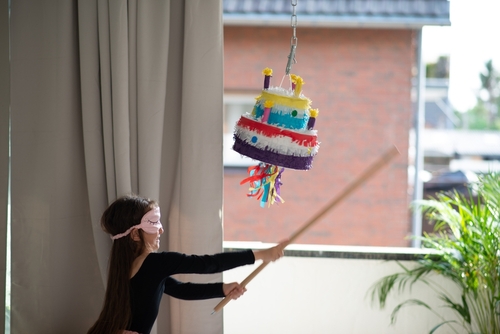
If you’ve ever been to a Mexican birthday party, you know the piñata is the star. Bright, colorful, and filled with candy, it’s a symbol of joy. Guests sing while kids take turns swinging at it, and the moment it bursts open is pure magic.
Another must-have is “Las Mañanitas,” the traditional birthday song that’s sung with love, sometimes by an entire mariachi band. Then comes “La Mordida”, the cake moment. Just when the birthday person leans in for a bite, someone pushes their face right into the frosting. It’s messy, hilarious, and unforgettable.
Mexican families in the US keep these traditions alive, often combining them with American-style cakes and decorations.
Fun fact: The first piñatas were actually made of clay, not paper, and used during religious festivals before they became birthday staples.
Denmark: flags and personalized songs
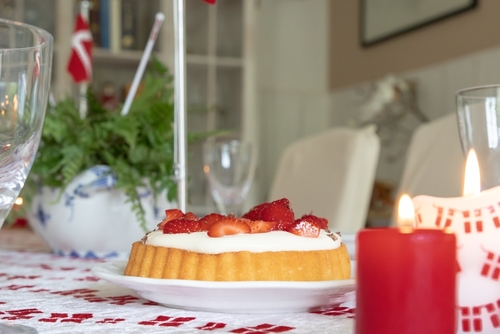
In Denmark, birthdays are all about making the person feel like royalty. The national Danish flag isn’t just for official ceremonies; it’s proudly displayed on the front lawn, the table, and even on cakes. For Danes, walking into a flag-filled space immediately makes the day feel festive.
Kids sometimes get a “birthday chair,” decorated with flowers and streamers so they feel extra special. Beyond childhood, Danish birthdays are cozy, filled with family, coffee, and lots of cake.
Fun fact: If you’re still single at 25, your Danish friends might douse you in cinnamon. However, if you’re single at 30 then it’s pepper.
Korea: doljanchi and the doljabi ritual
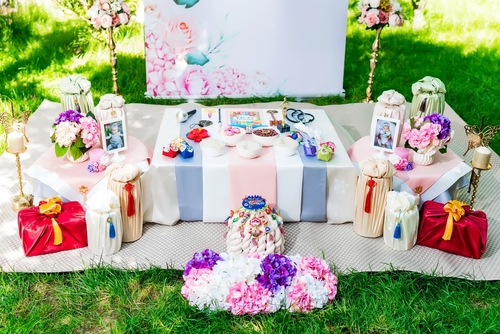
In Korea, the first birthday, doljanchi, is huge. Historically, making it to one year old was a big deal, so the tradition stuck.
Families set up a doljanchi table with fruit, rice cakes, and colorful decorations, but the highlight is the doljabi ritual. Objects like money, thread, or a pencil are placed next to the baby and whichever one they grab is believed to predict their future.
Food also matters. Rice cakes (tteok) symbolize prosperity, while seaweed soup (miyeok-guk) represents health and honors mothers. Even in immigrant communities abroad, Korean families keep these traditions alive, often livestreaming the doljabi so relatives back home don’t miss out.
Fun fact: Seaweed soup isn’t just a birthday dish—it’s traditionally eaten after childbirth, so serving it on birthdays is also a nod to the mom who made the day possible.
Ghana: food, music, and community
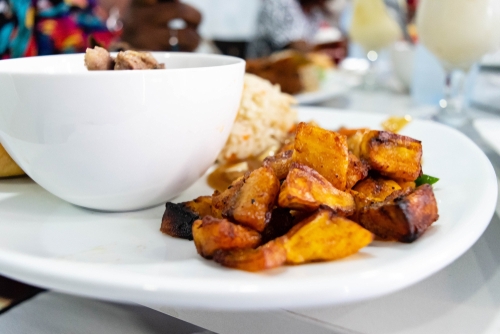
In Ghana, birthdays are less about “me” and more about “we.” Food plays a starring role, with dishes like hearty stews, rice, and kelewele—spiced fried plantains that are both sweet and savory. Parties often turn into communal feasts where extended family and neighbors gather to share in the joy.
Music and dance are essential, too. Drums set the rhythm as people sing, clap, and move together. It’s about celebrating life with energy and gratitude. For US-based Ghanaians, making kelewele or sharing traditional music at a birthday party is a way to carry a piece of home into new surroundings.
Fun fact: While birthday celebrations in Ghana have long existed in traditional forms, our globalized world means they’ve increasingly blended with more Western party customs like cakes, music, and dancing, particularly in urban areas.
The Philippines: noodles for longevity
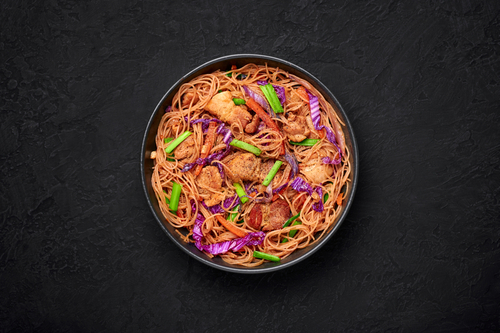
In the Philippines, birthdays are incomplete without pancit, a noodle dish that symbolizes long life. The rule is not to cut the noodles; they’re meant to stay long to represent many years ahead. Alongside pancit, it’s common to see lumpia (spring rolls) and plenty of cake, of course.
Celebrations are loud, warm, and community-driven. Karaoke often steals the spotlight, with everyone from kids to grandparents taking turns at the mic. For Filipinos living abroad, birthday karaoke nights keep the vibe alive and help everyone, from close family to new friends, feel included.
Fun fact: The Philippines has one of the highest numbers of karaoke machines per household, so singing your heart out at a birthday isn’t just encouraged, it’s expected.
India: blessings, temples, and new clothes
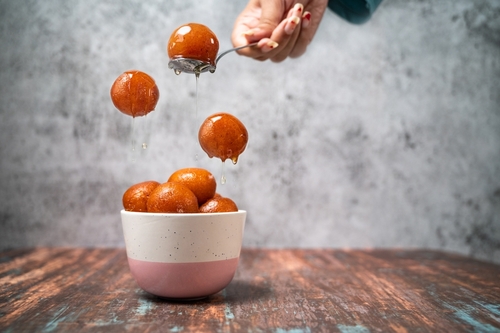
In India, birthdays often begin with a spiritual start. Families may head to a temple for blessings or light incense at home to give thanks. Children are usually dressed in new clothes as a symbol of a fresh start and good fortune for the year ahead.
Popular treats like gulab jamun, laddoos, or jalebi are shared with friends and neighbors. Many families also choose to donate food or money on important birthdays, turning the day into an act of gratitude as well as celebration. For Indian immigrants in the US, this mix of devotion, new clothes, and sweets is an easy way to stay rooted while embracing new traditions.
Fun fact: Some Indian families celebrate birthdays based on the lunar calendar, which means the date can shift year to year.
Nigeria: big gatherings and jollof rice
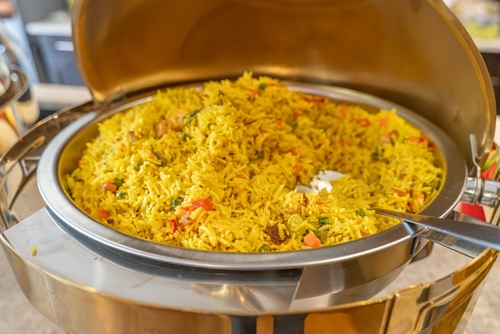
In Nigeria, birthdays are big, bold, and full of flavor. Large gatherings bring together extended family, friends, and neighbors, often with jollof rice, fried plantains, and grilled meats as the centerpiece. The meal is just the beginning, music and dancing often carry the party late into the night.
Milestone birthdays are especially important. A child’s first birthday, for example, can be celebrated almost like a wedding, with dozens (or even hundreds) of guests. For Nigerians abroad, cooking jollof rice and playing Afrobeat music at a US birthday party keeps the spirit of home alive.
Fun fact: Jollof rice isn’t just a birthday dish, it’s a staple at nearly every major celebration in West Africa, sparking friendly debates about which country makes it best.
United States: candles, wishes, and blended traditions
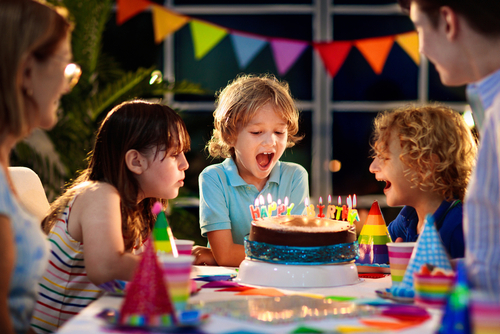
In the US, birthdays often mean blowing out candles, making a wish, and eating cake surrounded by balloons and streamers. The culture also emphasizes milestone birthdays, Sweet 16s, 18th, and 21st birthdays can feel like major rites of passage.
But what makes US birthdays especially fun is how flexible they are. Immigrant families often blend cultural traditions with American ones. A Mexican-American child might have both a piñata and a big frosted cake, while a Korean-American family could host a doljabi alongside a backyard barbecue.
Fun fact: While blowing out candles is now common worldwide, the practice actually began in Germany centuries ago before spreading across cultures.
The unifying power of birthday celebrations
At first glance, birthday traditions can feel worlds apart. But when you look closer, they all point to the same truth: birthdays are about celebrating life together.
What birthdays reveal about cultural values
Every birthday ritual tells a story. The traditions we’ve highlighted give us a glimpse into what each culture holds dear, whether it’s prosperity, health, family, or joy.
Recognizing these values helps us see the similarities beneath the differences. Across borders, we all want to care for our loved ones, wish them well, and mark life’s milestones with meaning.
Why international traditions enrich life abroad
For immigrants, birthdays become more than personal milestones, they’re cultural touchpoints. Sharing traditional foods, songs, or games with friends in a new country not only keeps heritage alive but also invites others to experience it.
Lighting candles on a cake alongside serving kelewele, or following up “Happy Birthday” with “Las Mañanitas,” blends traditions into something uniquely your own.
These layered celebrations are more than just fun. They build cultural bridges. They remind us that while traditions may look different, each one adds to a bigger picture of what it means to belong, to celebrate, and to connect across cultures.
Bringing global traditions into your own birthday
One of the best things about learning how birthdays are celebrated around the world is realizing you can borrow (or remix) those traditions for your own party. You don’t have to copy everything exactly, it’s about finding small touches that add meaning, personality, and fun.
Cook with cultural meaning
Food is one of the easiest and most impactful ways to bring global flair to your celebration. Even if you don’t have all the authentic ingredients, the gesture itself can spark conversations about tradition and even nostalgia among first-generation immigrants.
Decorate with symbols that tell a story
Instead of just streamers and balloons, try decorations with cultural meaning. Danish flags instantly make a room feel festive and show pride. A flower-covered birthday chair can turn even the simplest gathering into something memorable. Or add colors and designs from your heritage, it’s a subtle but powerful way of saying, “This is who I am.”
Make music part of the celebration
Music is one of the universal things that pops up in pretty much every culture’s birthday celebrations. From the Polish “Sto lat” to Sweden’s “Ja må du leva” and throughout the world, music doesn’t just entertain, it brings everyone into the moment and can be another powerful reminder of home for immigrants.
Playful rituals that everyone remembers and passes on
Traditions often stick with us because they’re interactive and connect us. These small rituals turn a party from ordinary into unforgettable.
Sharing why your family eats noodles, sings a certain song, or decorates in a particular way helps children understand where they come from. It’s a chance to celebrate not only another year of life, but also the culture and values that make your story unique.
How Do Sunday Traditions Incorporate Birthday Celebrations Around the World?
Sunday traditions often incorporate birthday celebrations, creating cherished memories. Across cultures, families gather for festive meals, playing games, and sharing stories. These events deepen connections and offer an opportunity to celebrate life. Such gatherings highlight the importance of sunday rituals for family bonding, making birthdays even more special.
FAQs
Why do cultural birthday traditions differ so much?
They grow out of each culture’s unique history, beliefs, and values, which shape how milestones are celebrated. What looks like a party game in one country may actually carry deep meaning in another.
How important is food in global birthday traditions?
Food is often at the heart of birthdays, symbolizing health, gratitude, or prosperity. Sharing a special meal also brings people together and makes the celebration memorable.
Do birthday traditions change with modernization?
Yes, many families now mix traditional customs with Western-style elements like cakes, balloons, or themed parties. This blending keeps traditions alive while making them adaptable to modern life.
How can I celebrate my birthday with global influences?
You could cook a dish that symbolizes good fortune, decorate with cultural symbols, or introduce a playful ritual. Small touches like karaoke or a piñata can instantly make a party feel more global and meaningful.
